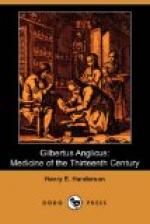[Footnote 1: In Leslie Stephen’s “Dictionary of Biography.”]
[Footnote 2: British Medical Journal, Nov. 12, 1904, p. 1282.]
In the first place then we must say that, as Gilbert is frequently quoted in the “Thesaurus Pauperum,” a work ascribed to Petrus Hispanus, who (under the title Pope John XXI) died in 1277, this date determines definitely the latest period to which the Compendium can be referred. If, as held by some historians, the “Thesaurus” is the work of Julian, the father of Petrus, the Compendium can be referred to an earlier date only.
Now Gilbert in his Compendium (f. 259a) refers to the writings of Averroes (Ibn Roschd) regarding the color of the iris of the eye. Averroes died in the year 1198. There is no pretense that Gilbert was familiar with the Arabic tongue, and the earliest translations into Latin of the writings of Averroes are ascribed by Bacon to the famous Michael Scot, though Bacon says they were chiefly the work of a certain Jew named Andrew, who made the translations for Scot. Bacon also says that these translations were made “nostris temporibus,” in our time, a loose expression, which may, perhaps, be fairly interpreted to include the period 1230-1250. But if, as Dr. Payne believes, Gilbert died about 1230, it seems improbable that he could have been familiar with the translations of Michael Scot. Accordingly Dr. Payne suggests that, after the death of his patron in 1205, Gilbert returned to the Continent, and, perhaps in Paris or at Montpellier, met with earlier Latin versions of the writings of the Arabian physician and philosopher. This is, of course, possible, but there is no historical warrant for the hypothesis, which must, for the present at least, be regarded as merely a happy conjecture of Dr. Payne. The presence of Gilbert upon the Continent, probably as a teacher of reputation, seems, however, quite probable. Littre has even unearthed the fact that during the 14th century a street in Paris near the medical schools, bore the name of the Rue Gilbert l’Anglois. A Ms. in the Bibliotheque Nationale entitled “Experimenta Magistri Gilliberti, Cancellarii Montepessulani” has suggested also the idea that Gilbert may have been at one time chancellor of the University of Montpellier. Dr. P. Pansier, of Avignon, however, who has carefully examined and published this manuscript[3], reports that while it contains some formulae found also in the Compendium of Gilbert, it contains many others from apparently other sources, and he was unable to convince himself that the compilation was in fact the work of Gilbertus Anglicus. Dr. Pansier also furnishes us with a list of the chancellors of Montpellier, which contains the name of a certain “Gillibertus,” chancellor of the university in 1250. He could find, however, no evidence that this Gillibertus was Gilbertus Anglicus, author of the Compendium Medicinae. On the whole then the visit of Gilbert to France early in the 13th century, and his access in this way to early translations of Averroes, while a convenient and plausible conjecture on the part of Dr. Payne, does not seem supported by any trustworthy historical evidence.




